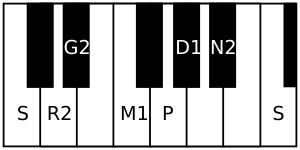Anandabhairavi
| Carnatic music |
|---|
 |
| Concepts |
| Compositions |
| Instruments |
|
| Arohanam | S G₂ R₂ G₂ M₁ P D₂ P Ṡ |
|---|---|
| Avarohanam | Ṡ N₂ D₂ P M₁ G₂ R₂ S |
Anandabhairavi or Ananda Bhairavi (pronounced ānandabhairavi) is a very old melodious rāgam (musical scale) of Carnatic music (South Indian classical music). This rāgam also used in Indian traditional and regional musics. Ānandam (Sanskrit) means happiness and the rāgam brings a happy mood to the listener.
It is a janya rāgam (derived scale) of the 20th Melakarta rāgam Natabhairavi
Structure and Lakshana[edit | edit source]
Its IAST (IAST: IAST)
structure is as follows (see swaras in Carnatic music for details on the notations used):
- [[Arohana|
IAST (IAST: IAST)
]] : S G₂ R₂ G₂ M₁ P D₂ P Ṡ[lower-alpha 1]
- [[Avarohana|
IAST (IAST: IAST)
]] : Ṡ N₂ D₂ P M₁ G₂ R₂ S[lower-alpha 2]
File:AnandaBhairavi.wav (chathusruthi rishabham, sadharana gandharam, shuddha madhyamam, Chatusruthi dhaivatham, kaishiki nishadham)
It is a sampoorna rāgam – rāgam having all 7 swarams, but it is not a melakarta rāgam, as it has vakra prayogam (IAST: vakra prayogam)
(zig-zag notes in scale) and uses
anya swaram (IAST: anya swaram)
(external note) in comparison with its parent rāgam. The anya swaram is the usage of shuddha dhaivatham (D1) in some phrases of the rāgam.[1]
Anandabhairavi ragam is also a bhashanga (IAST: bhashanga)
rāgam, since it uses more than one anya swaram. Anya swaram of a rāgam is the swaram which does not belong to the arohana or avarohana of its melakarta (parent rāgam), but it is sung in
prayogams (IAST: prayogams)
(phrases used in
raga alapana (IAST: raga alapana)
, kalpanaswarams). It is also classified as a "rakti" raga(a raga of high melodic content).
Swara phrases[edit | edit source]
The three anya swarams (IAST: anya swarams)
of
Anandabhairavi (IAST: Anandabhairavi)
are
antara gandharam (IAST: antara gandharam)
(G3),
suddha dhaivatam (IAST: suddha dhaivatam)
(D1) and kakali nishadham (N3).[1] All of these anya swaras occur only in
prayogas (IAST: prayogas)
(not in
arohana avarohana (IAST: arohana avarohana)
). "G3" occurs in "ma pa ma ga ga ma", and "D1" occurs in "ga ma pa da". Subtler than the first two, "N3" occurs in "sa da ni sa."
It is said that Tyagaraja and Muthuswami Dikshitar do not use any of the anya swarams (IAST: anya swarams)
in their compositions.Template:Ciation needed
Anandabhairavi also has unique swara patterns both in manodharma (impromptu improvisations by performer) and in its compositions. The popular patterns are "sa ga ga ma", "sa pa", and "sa ga ma pa". The musician isn't allowed to stay long on nishadam, this characteristic distinguishes it from Reetigowla. Few allied ragas (similar) to this are Reetigowla and Huseni.
Popular compositions[edit | edit source]
Anandabhairavi is one of the favourite ragams of Syama Sastri. He is said to have made this a popular rāgam and also to have given the present form for this rāgam.[1] More or less Anandabhairavi's synonym is "Marivere gati" by Syama Sastri. In "Mariverae" and in "O jagadhamba" Syama Sastri uses the anya swara "ga(2)".A very life changing incident is said to have happened in Thyagaraja's life. Once he is said to have attended a Kuchipudi bhagavata artists dance-drama recital,a ballad between mythological characters Radha and Krishna, and he is said to have highly praised their performance, especially a particular song Mathura Nagarilo, which was again set in Ananda Bhairavi. Thyagaraja wanting to acknowledge them offered to give them a gift, of anything that they may desire, that he could possibly give. After much thought they demanded him the Ragam Ananda Bhairavi itself as a gift ( meaning that he would accept to never sing in that ragam ever again in his life),so that when someone in the near future spoke of Thyagaraja or Ananda Bhairavi's legacy they would also remember the Kuchipudi dancers too.
- Sami ni pai Adathalavarnam by Veena Kuppayyar
- Yathum oore Anthem (written by Kaniyan Pungundranar) by Composer Rajan, the theme song of 10th World Tamil Conference from Sandham: Symphony Meets Classical Tamil
- Paavanasuguna Aadithalavarnam by Swathi Thirunal in Sanskrit
Sakhiye intha velayil (IAST: Sakhiye intha velayil)
Padavarnam by Ponniah Pillai in Tamil
- Ittii MuddulAdibAludedavade by Annamacharya in Telugu
- Kamti SukravAramu by Annamacharya in Telugu
- Neene Dayalu, Veera Hanuma Bahu, Hodi Nagari Mele, Summane Baruvude Mukti, Srinivasa neene, by Purandaradasa in Kannada
- Laali Govinda Laali By Sripadaraja
- Palayachyutha Palayajitha, By Vadiraja Tirtha in Sanskrit
- Smarasi Puraguru from the KuchelaUpakyanam by Swathi Thirunal
- Paluke Bangaramayena by Bhadrachala Ramadasu in Telugu
- Nike Teliyaka in Adi thalam by Thyagaraja in Telugu
- Marivere Gati, O jagadhamba, Pahi Srigirijasuthe, Himachala Tanaya by Syama Sastri in Telugu
- Maanasa guruguha, Dandayudhapanim, Kamalamba Samrakshatu, Anandeswarena and Thyagaraja yoga vaibhavam by Muthuswami Dikshitar in Sanskrit
- Shringara velavan vandhan, by Papanasam Sivan in Tamil
- Krishna Karuna, Pahi Tharakshupuralaya, Varija Vadana by Swathi Thirunal in Sanskrit
- Poonthen Nermozhi, Balike Moham, Maanini Vamata are three padams by Swathi Thirunal in Malayalam
- Dhim dhim dhim thillana by Swathi Thirunal
- Andolika Vahane (Utsavaprabandham) by Swathi Thirunal in Malayalam
- Samaganapriye by Periyasaamy Thooran in Tamil
- Poo Mel Valarum Annaiye by Mazhavai Chidambara Bharathi in Tamil
- Raghudvaha Dâsa by Kalyani Varadarajan
Film Songs[edit | edit source]
Language:Tamil[edit | edit source]
Album[edit | edit source]
| Song | Album | Composer | Singer |
|---|---|---|---|
| Yaadhum Ure Anthem | Sandham | Rajan Somasundaram | Karthik, Bombay Jayashri |
